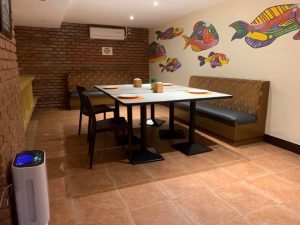#ISSISupportsMSMEs
The food and restaurant business has not been spared from the impacts of the coronavirus disease pandemic. Like any other sector, the food service industry was adversely affected by the global health crisis as they have not been allowed to accommodate in-person dining and had to resort to limited operations for long months upon the imposition of strict health protocols. A sharp drop in sales left them with no choice at all but to halt their business for a few months and some even had to succumb to a permanent closure.

With this seemingly intractable situation, restaurant owners were compelled to rethink their strategies and find a way to cater to the needs of their customers. Some had to adjust their pricing, operating hours, others needed to close some of their branches, and worse, limited their human resources just to stay afloat.
One of the well-loved family-run restaurants in Marikina that braved these turbulent times is Dapo at Tisa. This more than half a decade-old food place cleverly maximized its means to figure out which effective and efficient adjustments to make in order to survive the challenges of this pandemic. According to its owner, Mr. Vincent “Teng” De Castro, the food and restaurant service sector has slowly learned to swim with the tide and has seen the long-term viability of the food business when coupled with the e-commerce platforms. Pre-pandemic, customers would enjoy dining-in and savoring the signature seafood dishes this Filipino cuisine resto offers such as sinigang na ulo ng salmon sa sampaloc (salmon head in sour tamarind soup), sinigang na salmon belly sa miso (salmon belly in miso soup), seafood paella, and many more.

“Running a restaurant business became even more difficult and competitive. Maswerte pa ako, maaga kong tinanggap ang technology (I am considered lucky, I accepted the technology beforehand),” De Castro said.
Developing a one-of-a-kind gastronomic experience for customers is one thing, but providing a more convenient ordering experience while implementing safety systems truly makes the difference especially when people cannot physically visit restaurants in this day and age due to health concerns.
Opposite to the typical roles of restaurant and kitchen crews that are usually composed of a wide array of tasks like food preparation, putting a premium on hygiene and sanitation, and most importantly, providing a total customer experience, De Castro also became ingenious by providing technological capacity-bridging to his staff.
He added, “May mga tao akong dating dining crew, ngayon taga sagot na rin sila ng orders sa Messenger (My staff before served as dining crew and are now taking orders using Messenger”.

Dapo at Tisa as a pivot strategy subscribed to cloud kitchen where operations are a shared commissary for food service businesses and restaurants. This cutting-edge strategy in the food business allowed restaurant owners to minimize operational, marketing, and infrastructure expenses, while still holding high regard for customer satisfaction and convenience. These restaurants are usually housed in a commercial facility intentionally built to cook food specifically for deliveries. These commissary kitchens are also called shared kitchens, ghost kitchens, or virtual kitchens which provide a delivery-only service. This service is available in known e-commerce and food delivery service platforms. Gone are the days that you needed to hop from one food place to another because customers have the liberty to mix and match their orders under one roof and pay for one delivery fee.
Asked if he had something to say to his customers, he said: “Nagpapasalamat talaga kami na sinuportahan kami ng mga existing clients despite the many choices online. Nagstick pa rin sila sa amin (We are really grateful to our customers who remained loyal and supportive to us despite the many choices online. They still stick with us)”.
This sector, being considered a significant chunk of our economy, needs to be more resilient and adaptable to the challenges of the present times. Embracing these changes and being more receptive to them even after the pandemic will help them propel their businesses forward and harness customer confidence.
De Castro’s unfaltering dedication to this industry, to his employees, and to his customers paid off when he bagged the MVP Bossing Award last year. PLDT Enterprise spearheaded this semi-annual award since 2009 with the goal of celebrating the most accomplished men and women in entrepreneurship. The 2020 edition revolves around the theme of conveying a message of hope, and appreciating local entrepreneurs who took on the challenges their businesses faced because of the global health crisis.
To order food from Dapo at Tisa, send them a message on Facebook or you may call them at 7730-2723 / 8635-3854. The store is located at 77 Lilac Street, SSS Village, Marikina City and is open only for pick-up. You can also order their signature dishes via Grab Food and Food Panda.
Disclaimer: The views expressed herein or in any article in the UP ISSI website are those of the authors and do not necessarily reflect the policies or opinions of UP ISSI nor the views of the University of the Philippines. Regarding Accuracy of Information and Usage of Data: Visitors and users of the UP ISSI website are advised that information contained within the website is assumed to be accurate. However, errors can occur even with computer-generated information. UP ISSI makes no representation regarding the completeness, accuracy, or timeliness of such information and data, or that such information and data will be error-free. Visitors are encouraged to review the official version of all documents on which they plan to rely on.